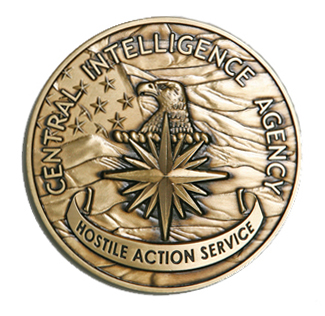
Francis Gary Powers was an American pilot whose Central Intelligence Agency (CIA) U-2 spy plane was shot down while flying a reconnaissance mission in Soviet Union airspace, causing the 1960 U-2 incident.
The Purple Heart is a United States military decoration awarded in the name of the president to those wounded or killed while serving, on or after April 5, 1917, with the U.S. military. With its forerunner, the Badge of Military Merit, which took the form of a heart made of purple cloth, the Purple Heart is the oldest military award still given to U.S. military members – the only earlier award being the obsolete Fidelity Medallion. The National Purple Heart Hall of Honor is located in New Windsor, New York.

Allen Welsh Dulles was an American diplomat and lawyer who became the first civilian Director of Central Intelligence (DCI), and its longest-serving director to date. As head of the Central Intelligence Agency (CIA) during the early Cold War, he oversaw the 1954 Guatemalan coup d'état, Operation Ajax, the Lockheed U-2 aircraft program and the Bay of Pigs Invasion. Dulles was one of the members of the Warren Commission investigating the assassination of John F. Kennedy. Between his stints of government service, Dulles was a corporate lawyer and partner at Sullivan & Cromwell. His older brother, John Foster Dulles, was the Secretary of State during the Eisenhower Administration.

On 1 May 1960, a United States U-2 spy plane was shot down by the Soviet Air Defence Forces while performing photographic aerial reconnaissance deep into Soviet territory. The single-seat aircraft, flown by pilot Francis Gary Powers, was hit by an S-75 Dvina surface-to-air missile and crashed near Sverdlovsk. Powers parachuted safely and was captured.
Leroy Fletcher Prouty served as Chief of Special Operations for the Joint Chiefs of Staff under President John F. Kennedy. A former colonel in the United States Air Force, he retired from military service to become a bank executive. He subsequently became a critic of U.S. foreign policy, particularly the covert activities of the Central Intelligence Agency (CIA) about which he had considerable inside knowledge. Prouty was the inspiration for the character "Mr. X" in Oliver Stone's film JFK.
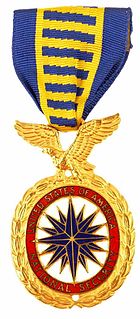
The National Security Medal is a decoration of the United States of America officially established by President Harry S. Truman in Executive Order 10431 of January 19, 1953. The medal was originally awarded to any person, without regard to nationality, for distinguished achievement or outstanding contribution on or after July 26, 1947, in the field of intelligence relating to the national security of the United States.

The 1954 Guatemalan coup d'état, code-named Operation PBSUCCESS, was a covert operation carried out by the U.S. Central Intelligence Agency (CIA) that deposed the democratically elected Guatemalan President Jacobo Árbenz and ended the Guatemalan Revolution of 1944–1954. It installed the military dictatorship of Carlos Castillo Armas, the first in a series of U.S.-backed authoritarian rulers in Guatemala.

Robert Michael Gates is an American statesman, scholar, intelligence analyst, and university president who served as the 22nd United States Secretary of Defense from 2006 to 2011. He was originally appointed by President George W. Bush, but was retained for service by President Barack Obama. Gates began his career serving as an officer in the United States Air Force but was quickly recruited by the CIA. Gates served for 26 years in the Central Intelligence Agency and the National Security Council, and was Director of Central Intelligence under President George H. W. Bush. After leaving the CIA, Gates became president of Texas A&M University and was a member of several corporate boards. Gates served as a member of the Iraq Study Group, the bipartisan commission co-chaired by James A. Baker III and Lee H. Hamilton, that studied the lessons of the Iraq War.

The Korean War Service Medal, also known as the Republic of Korea War Service Medal (ROKWSM), is a military award of South Korea which was first authorized in December 1950.
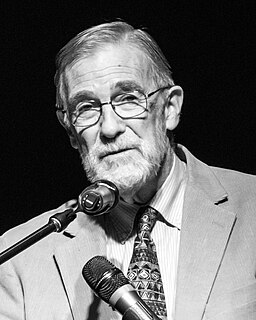
Raymond McGovern is a former CIA officer turned political activist. McGovern was a CIA analyst from 1963 to 1990, and in the 1980s chaired National Intelligence Estimates and prepared the President's Daily Brief. He received the Intelligence Commendation Medal at his retirement, returning it in 2006 to protest the CIA's involvement in torture. McGovern's post-retirement work includes commenting for Consortium News, RT, and Sputnik News, among other outlets, on intelligence and foreign policy issues. In 2003 he co-founded Veteran Intelligence Professionals for Sanity (VIPS).
Abdul Wali was an Afghan man who died in US custody on June 21, 2003 at the age of 28. At the time of his death, he had been held for three days at the US base 10 miles south of Asadabad, in Kunar Province, Afghanistan, on suspicion of involvement in a rocket attack on the same base, after voluntarily handing himself in. The cause of his death was at first reported to be a heart attack, but this came into question when three members of the U.S. 82nd Airborne Division came forward to testify that CIA contractor David Passaro assaulted Wali. Passaro, a former U.S. Army Ranger, allegedly beat Wali for two consecutive nights, causing grievous injuries including a fractured pelvis. Prosecutors would charge that Passaro ordered soldiers not to allow Wali to sleep, limited his access to food and water and subjected him to two consecutive nights of interrogation and beatings. Among other injuries, Wali suffered a suspected fractured pelvis that would have made it impossible for him to urinate. Witnesses testified that during one session Passaro, while wearing combat boots, kicked Wali in the groin hard enough to lift him off the ground, threw Wali to the ground, beat Wali on the arms and legs with a heavy Maglite flashlight, and that Passaro also vigorously thrust a flashlight into Wali's abdomen. After the second night of beatings, Wali begged the soldiers to kill him and moaned a phrase that meant, "I'm dying." Wali died on his fourth day in custody. He repeatedly denied any involvement in the rocket attacks.
The Intelligence Star is an award given by the Central Intelligence Agency to its officers for "voluntary acts of courage performed under hazardous conditions or for outstanding achievements or services rendered with distinction under conditions of grave risk". The award citation is from the Director of the Central Intelligence Agency and specifically cites actions of "extraordinary heroism". It is the third-highest award given by the Central Intelligence Agency, behind the Distinguished Intelligence Cross and Distinguished Intelligence Medal, and is analogous to the Silver Star, the US military award for extraordinary heroism in combat. Only a few dozen people have received this award, making it one of the rarest valor awards awarded by the US government.
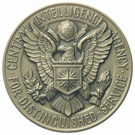
The Distinguished Intelligence Medal is awarded by the U.S. Central Intelligence Agency for performance of outstanding services or for achievement of a distinctly exceptional nature in a duty or responsibility.
John Thomas Downey was a Central Intelligence Agency operative who was held captive in China from November 1952 to March 1973. After release, he studied law and became a Connecticut Superior Court Judge.
S. Eugene Poteat is a retired senior Central Intelligence Agency executive. He was awarded the CIA's Intelligence Medal of Merit and the National Reconnaissance Office Meritorious Civilian Award. He was President of AFIO - the Association of Former Intelligence Officers for fifteen years, retiring in 2014, and appointed AFIO's President-emeritus in 2015. He previously served on the Board of Advisors of the International Spy Museum. He is currently Professor Emeritus at the Institute of World Politics in Washington, D.C., teaching a course on "Technology, Intelligence, Security, and Statecraft".

The Superior Honor Award is an award of the United States Department of State. Similar versions of the same award exist for the former U.S. Information Agency, Arms Control and Disarmament Agency, and USAID. It is presented to groups or individuals in recognition of a special act or service or sustained extraordinary performance covering a period of one year or longer.
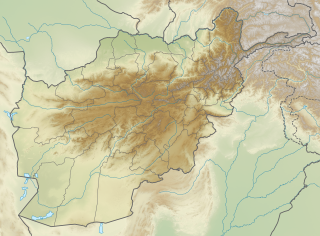
The Camp Chapman attack was a suicide attack by Humam Khalil Abu-Mulal al-Balawi against the Central Intelligence Agency facility inside Forward Operating Base Chapman on December 30, 2009. One of the main tasks of the CIA personnel stationed at the base was to provide intelligence supporting drone attacks against Pakistan. Seven American CIA officers and contractors, an officer of Jordan's intelligence service, and an Afghan working for the CIA were killed when al-Balawi detonated a bomb sewn into a vest he was wearing. Six other American CIA officers were wounded. The bombing was the most lethal attack against the CIA in more than 25 years.
Raymond Allen Davis is a former United States Army soldier, private security firm employee, and contractor with the Central Intelligence Agency (CIA). On January 27, 2011, Davis killed two reportedly armed men in Lahore, Punjab, Pakistan. Although the U.S. government contended that he was protected by diplomatic immunity because of his employment with the U.S. Consulate in Lahore, Davis was jailed and criminally charged by Pakistani authorities with double murder and the illegal possession of a firearm. A car coming to aid Davis killed a third Pakistani man, Ibadur Rahman, in a "hit and run" while speeding on the wrong side of the road. On March 16, 2011, Davis was released after the families of the two killed men were paid $2.4 million in diyya. Judges then acquitted him on all charges and Davis immediately departed Pakistan.

The Agency Seal Medal is awarded by the Central Intelligence Agency to non-Agency personnel, including U.S. Government employees and private citizens, who have made significant contributions to the Agency’s intelligence efforts.
